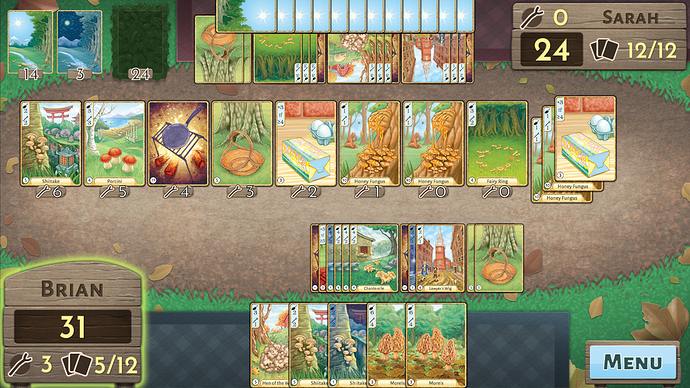Originally published at: https://statelyplay.com/2018/12/11/review-morels/
iOS, Android •
While my gaming desires tend to lean toward heavier fare such as Through the Ages or Twilight Struggle, there’s a warm place in my heart for simple, quick card games. Games that, while sitting at your child’s Holiday Concert and you spot another dad from your game group, can be played without dedicating all your attention, thus lowering the chances of your wife catching you sneaking turns. This is an entirely hypothetical situation, by the way. I’d never play games…who am I kidding? Lost Cities was our School Concert/Play/Sports game of choice but it has been surpassed by a little game that, until November, none of us had played, Morels. [Whoa, big reveal! It’s in the title of the piece you dink -ed.]
Morels is a game about picking and, more importantly, devouring mushrooms and comes complete with a disclaimer touting the dangers of hunting and eating shrooms on your own. I’m far too lazy to head out and pick my own mushrooms, but if Morels inspires you to do so, don’t come running back to Mossbark or Two Lanterns Games when you mistake a Destroying Angel for a Chanterelle.
I’m getting ahead of myself. There’s no death, hallucinations, or even violent gastro-intestinal discomfort involved in Morels. In fact, the game is a pleasant way to go about killing a few minutes now and then. Offering a smidgen of strategy and tactics, Morels is a game that suits the Stately crowd, but it’s also easy enough to grok that digital board game neophytes can jump right in.
What we have is a set collection game in which players wander the woods, aka card drafting line, searching for the shroom of their dreams. Even non-mycophiles know that just collecting the fungi isn’t the endgame; the best thing about mushrooms is the taste, especially with a lot of butter and, if you’re especially adventurous, cider. If you want to score points in Morels, you’ll have to saute your quarry, earning points for the number and type of mushrooms in the pan. Without grabbing pans to cook, your score will be unfavorably low, and hoarding pans to prevent your opponent from cooking is a valid, if hard to pull off, strategy.
[caption id=“attachment_6865” align=“aligncenter” width=“1000”]
There are also bad mushrooms that can poison you, but I find they never get picked up (for good reason) and only really block you from picking up the Decay pile. Oh, I didn’t mention that either. Wow, I’m terrible.[/caption]If you don’t want to cook your sets of 3+ mushroom, you can always trade in pairs or better for “foraging sticks”. These are an in-game currency which allow you to pull cards from earlier in the drafting line. Otherwise you’re stuck waiting for the juiciest morsels to slowly make their way to the free slots at the end. Of course, a savvy opponent will know what you’re looking for and pounce on them before you get a chance. This balance between eating and transmuting your catch is a tight rope to walk and one I haven’t managed to master. It’s a given that I’ll never have enough sticks to grab that last Fairy Ring or Lawyer’s Wig in time.
There’s more to Morels that flesh out the game a bit and make it a deeper experience than the aforementioned Lost Cities. Most cards are “day” cards offering one type of goodie, but there are also “night” cards–one for each type of mushroom–that count as a pair. You don’t know which species of fungi you’re going to get when you pick up a Night card, however, but at least you always know you can trade it in for foraging sticks (it is a pair, after all). Getting an injection of two shrooms that you were actively collecting can make a world of difference, however, and can bring a player who’s far behind to a more respectable point total.
There’s also butter and cider which add points to your cooked delights, if your sets are big enough. You’ll need at least four shrooms for the butter and a massive five for the cider, however. If you’re really insane, you can try to collect nine of one type and use both butter and cider, but most of the species don’t even have that many cards in the entire deck. Proceed with caution.
Morels is a fun, light game that I’ve really been enjoying. The app itself is rather sparse, but it does everything it needs to. There are three levels of AI as well as online, asynchronous play. The game uses “friend codes” instead of a proper login, which is annoying, but manageable. I find that the game is far less rewarding when playing asynchronously than in real time. The short turns combined with long waits deadens a bit of the joy, but if you can manage to both log on together (with a friend at, I don’t know, your kid’s holiday concert) and play in real time, I guarantee you won’t only play once. There’s an addictive quality to the quick gameplay and it doesn’t hurt that the app is pretty to look at and has that awesome “clacking” sound when you earn or spend foraging sticks.
I can’t wait to see what Mossbark works on next, but I know I’ll be playing a lot of Morels while I’m waiting.
https://youtu.be/s8T0bb_kspI
